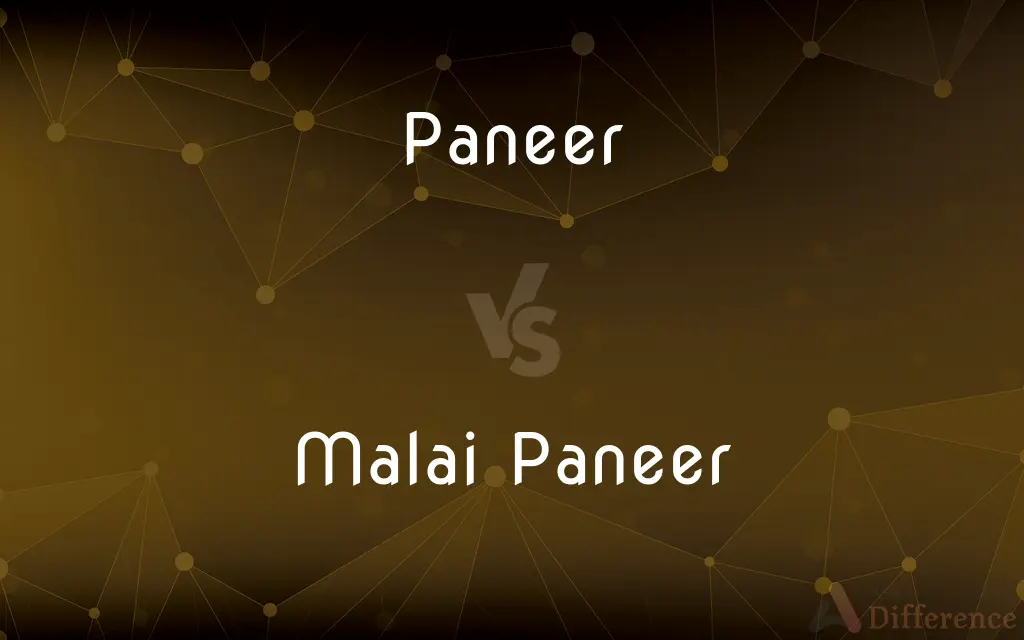Paneer vs. Malai Paneer — What's the Difference?
By Tayyaba Rehman — Published on January 19, 2024
Paneer is a fresh, non-melting cheese used in Indian cuisine, while Malai Paneer is a softer, creamier version enriched with cream (malai), offering a richer flavor and texture.

Difference Between Paneer and Malai Paneer
Table of Contents
ADVERTISEMENT
Key Differences
Paneer, a staple in Indian cooking, is a fresh cheese made by curdling milk with an acid like lemon juice or vinegar. Malai Paneer, on the other hand, is a variation of paneer that includes cream (malai), making it richer and creamier.
In terms of texture, paneer is firm and can hold its shape well, making it suitable for grilling and frying. Malai Paneer is softer and more delicate due to the addition of cream, providing a smoother texture.
Paneer has a mild, milky flavor suitable for absorbing spices and flavors in various dishes. Malai Paneer, with the addition of cream, has a slightly richer taste and a more luxurious mouthfeel.
Nutritionally, paneer is a good source of protein and calcium but lower in fat compared to Malai Paneer. The latter, with added cream, is higher in fat content and calories.
In culinary use, paneer is versatile, used in dishes like Palak Paneer and Paneer Tikka. Malai Paneer, being softer, is often used in richer gravies and dishes where a more delicate texture is desired.
ADVERTISEMENT
Comparison Chart
Base Ingredient
Milk curdled with acid
Milk curdled with acid and cream
Texture
Firm and can hold shape
Softer and more delicate
Flavor
Mild, milky, absorbs spices well
Richer, creamier
Nutritional Value
Lower in fat, high in protein
Higher in fat and calories
Culinary Uses
Grilling, frying, versatile in dishes
Used in richer, cream-based gravies
Compare with Definitions
Paneer
Paneer has a mild flavor and firm texture, holding its shape in various preparations.
Paneer cubes maintain their form even when cooked in a spicy gravy.
Malai Paneer
Malai Paneer is a softer, cream-enriched version of paneer with a richer texture.
Malai Paneer adds a luxurious touch to a creamy curry.
Paneer
Paneer is a type of fresh, non-melting cheese popular in Indian cuisine.
Paneer is often cubed and added to spinach to make the dish Palak Paneer.
Malai Paneer
Malai Paneer has a more delicate flavor and texture compared to regular paneer.
Malai Paneer melts in the mouth, making it a favorite in rich gravies.
Paneer
Paneer is high in protein and calcium, making it a nutritious addition to meals.
Adding paneer to a vegetable stir-fry increases its protein content.
Malai Paneer
Suited for dishes requiring a creamy and smooth consistency.
In Butter Paneer Masala, using Malai Paneer enhances the dish's creaminess.
Paneer
Made by curdling milk with a food acid, paneer is a vegetarian protein source.
Paneer is a great meat alternative in Indian vegetarian dishes.
Malai Paneer
Malai Paneer is higher in calories and fat due to the added cream.
For a richer diet, Malai Paneer is the preferred choice over regular paneer.
Paneer
It is commonly used in savory dishes but can also be used in sweet preparations.
Paneer can be crumbled and sweetened to make desserts like Rasgulla.
Malai Paneer
It is made by adding cream (malai) to the traditional paneer-making process.
The addition of malai during its preparation gives Malai Paneer its distinct creaminess.
Paneer
A soft unsalted and unripened cheese made from milk that is simmered, curdled using lemon juice, vinegar, yogurt, or a similarly acidic substance, and then drained and pressed in cheesecloth.
Paneer
A soft, non-matured, Indian cheese.
The spinach was mixed with paneer to make a satisfying meal.
Common Curiosities
What makes Malai Paneer different in taste?
The addition of cream (malai) to Malai Paneer gives it a richer and creamier taste compared to regular paneer.
What is the primary difference between Paneer and Malai Paneer?
Paneer is a basic Indian cheese, while Malai Paneer is enriched with cream, making it softer and richer.
Is Paneer healthier than Malai Paneer?
Paneer is generally considered healthier due to its lower fat content compared to the creamier Malai Paneer.
Can both Paneer and Malai Paneer be eaten raw?
Yes, both Paneer and Malai Paneer can be consumed raw and are often added to salads or eaten as snacks.
Is Paneer suitable for lactose-intolerant individuals?
Paneer may contain minimal lactose, but it's generally not suitable for individuals with severe lactose intolerance.
Are Paneer and Malai Paneer vegan?
No, both Paneer and Malai Paneer are made from milk and are not vegan.
What are some popular dishes made with Paneer and Malai Paneer?
Popular Paneer dishes include Palak Paneer and Paneer Tikka, while Malai Paneer is often used in creamy curries.
How should Paneer and Malai Paneer be stored?
Both should be stored in the refrigerator and consumed within a few days, or they can be frozen for longer storage.
Can Malai Paneer be used in all recipes that call for Paneer?
Malai Paneer can be used in most paneer recipes, but its softer texture may not be ideal for all cooking methods, like deep frying.
How is Paneer made?
Paneer is made by curdling milk with an acid like lemon juice or vinegar, and then pressing the curds.
How do Paneer and Malai Paneer contribute to the nutritional value of a dish?
Both add protein and calcium to dishes, with Malai Paneer being higher in fat and calories.
Can lactose-free milk be used to make Paneer or Malai Paneer?
Lactose-free milk can be used, but the texture and taste of the resulting cheese may vary.
How does the texture of Paneer compare to that of Malai Paneer in cooked dishes?
Paneer maintains a firmer texture when cooked, while Malai Paneer becomes softer and more delicate.
Can Paneer be substituted with Malai Paneer in sweets?
Yes, Malai Paneer can be used in sweets, offering a creamier texture than regular paneer.
Is Malai Paneer suitable for grilling or frying like Paneer?
Malai Paneer is softer and may not hold up as well as Paneer in grilling or frying.
Share Your Discovery

Previous Comparison
Telegram vs. Telegram X
Next Comparison
Microsoft Keyboard 850 vs. Microsoft Keyboard 900Author Spotlight
Written by
Tayyaba RehmanTayyaba Rehman is a distinguished writer, currently serving as a primary contributor to askdifference.com. As a researcher in semantics and etymology, Tayyaba's passion for the complexity of languages and their distinctions has found a perfect home on the platform. Tayyaba delves into the intricacies of language, distinguishing between commonly confused words and phrases, thereby providing clarity for readers worldwide.












































